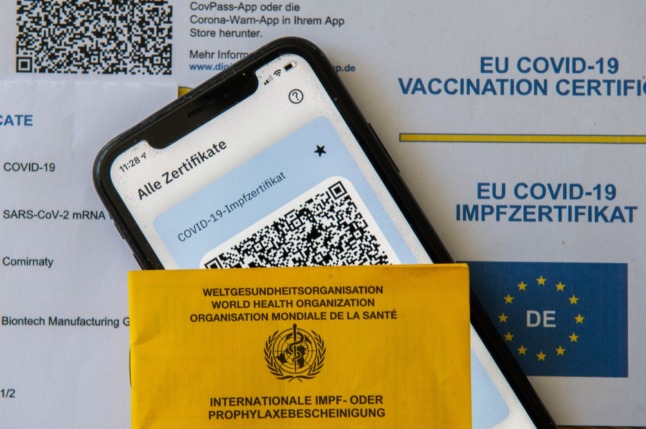So Germany (and other EU countries) have a digital vaccination certificate. What is it?
You have to be fully jabbed to use the digital vaccination certificate (known in Germany as the Impfpass or Impfnachweis). You can upload the certificate to your phone – either in the CovPass app or the Corona Warn app. And two weeks after your last jab, you’re good to go.
It will also soon be possible to store negative test results and recovery from Covid certificates on the Covid health pass. This next stage of development should be completed by the end of June, according to the Health Ministry.
Users of the digital vaccination passport will likely be exempt from testing and quarantine obligations when travelling if they are fully vaccinated or have recovered from Covid.
However, EU countries will continue to decide for themselves on travel restrictions. So it may be that tougher rules are brought in if Covid cases rise or new variants spread.
READ ALSO:
- What is Germany’s new digital ‘CovPass’ ?
- German pharmacies to start offering digital vaccine certificates
Where can I get it?
When you go for your jabs, the digital proof of vaccination should be generated in the doctor’s office or in the vaccination centre. You’ll receive a paper certificate with a code on it that can be scanned into your phone. You’ll typically receive a code for each jab, and both can be scanned into your smartphone.
For those who’ve already had their shots from vaccination centres, the centres should send out the QR codes in the post or make them available through an online portal. Check with your local authority on what procedure is in place.
If you have been previously vaccinated at a doctor’s practice, the doctor should issue you with the certificate. But if they don’t manage to, you can also visit participating pharmacies for it.
Pharmacy staff can check your evidence of vaccination, plus photo ID (like a passport), and then issue you with the QR code.
How does it work?
People in Germany download the CovPass app to scan the vaccination certificates (QR codes). This way, they can show their full vaccination coverage via QR code in the app when needed.
An update is also being made to the Corona Warn app, which also offers the option of scanning and managing the digital vaccination certificates (QR codes).
Residents should keep the issued QR codes to be able to scan them again if necessary (e.g. when changing cell phones).
READ ALSO: German pharmacies begin offering digital vaccination certificates
Note that currently the CovPass app is only available on the German iTunes Store. But that is likely to be extended to other app stores. As we mentioned, you can also upload it to the Corona Warn app.
So I have my pass. Can I use it for travel?
The German Health Ministry confirmed to The Local that the digital certificate can be used for travel within the EU. For countries outside the EU it won’t be possible to use the digital proof of vaccination just yet – but that might change in future.
A Health Ministry spokesperson told us: “The pass can be used for trips to other EU countries. Talks are currently underway at international level for recognition in countries outside the EU.”
You can also use it for proof of vaccination in Germany, for example at restaurants or for events.
What is the aim of the EU pass?
According to the EU the digital Covid certificate “will facilitate safe free movement of citizens in the EU during the COVID-19 pandemic.” Essentially that means no quarantine measures or need to supply negative Covid tests before or after travel.
The idea is that the document – which can be on paper or stored electronically on smartphones – will carry proof via a QR code that the holder has either:
- been vaccinated against Covid-19
- recently recovered from the virus (meaning the holder has antibodies in their system)
- recently tested negative for Covid
This proof can be shown to whoever requires it, whether border police or airline and rail officials.
The certificates should be free and come in both English and the national language where they are distributed, the EU says. They are being distributed now within countries across the bloc.
It’s worth noting that the Covid certificates are not compulsory for travel within the EU, but those who travel without it will likely be subject to whatever requirements are in place around testing and quarantine.
From Thursday July 1st it will be rolled out across the EU and Schengen area and possibly after that non-EU/Schengen countries like the UK and the US will become part of the scheme to allow for smooth travel between those countries and member states
Germany recently opened up travel to the US, and several non-EU countries – with some conditions.
For more details read our explainer:
How does the new EU Covid certificate work and how can I get one?
What about if I have a foreign vaccination certificate?
In Germany, you may be able to access the digital pass if you take your foreign vaccination pass to a pharmacy and ask them to convert it for you. The prerequisite is that it must be a vaccine approved in the EU. That currently is BioNTech/Pfizer, Moderna, AstraZeneca and Johnson and Johnson.
But it really is at the pharmacy’s discretion on whether you get it or not. We’ve heard from readers that they have managed to get the digital pass if they check with several different pharmacies – so you could get lucky on that front.
READ MORE: How I got Germany’s new digital CovPass with my American vaccine certificate
The official line from the German government is that there is no formal agreement in place for recognising foreign vaccine certificates.



 Please whitelist us to continue reading.
Please whitelist us to continue reading.
Member comments